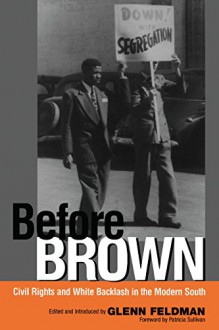Before Brown details the ferment in civil rights that took place across the South before the momentous Brown vs. Board of Education decision in 1954. This collection refutes the notion that the movement began with the Supreme Court decision, and suggests, rather, that the movement originated in...
show more
Before Brown details the ferment in civil rights that took place across the South before the momentous Brown vs. Board of Education decision in 1954. This collection refutes the notion that the movement began with the Supreme Court decision, and suggests, rather, that the movement originated in the 1930s and earlier, spurred by the Great Depression and, later, World War II—events that would radically shape the course of politics in the South and the nation into the next century.This work explores the growth of the movement through its various manifestations—the activities of politicians, civil rights leaders, religious figures, labor unionists, and grass-roots activists—throughout the 1940s and 1950s. It discusses the critical leadership roles played by women and offers a new perspective on the relationship between the NAACP and the Communist Party.Before Brown shows clearly that, as the drive toward racial equality advanced and national political attitudes shifted, the validity of white supremacy came increasingly into question. Institutionalized racism in the South had always offered white citizens material advantages by preserving their economic superiority and making them feel part of a privileged class. When these rewards were threatened by the civil rights movement, a white backlash occurred."A valuable and timely volume . . . particularly welcome for the emphasis it places on the churches, on white women, and on returning black and white veterans, groups whose postwar role has been too long ignored."—Tony Badger, author of The New Deal: The Depression Years, 1933-1940 and editor of, with Brian Ward, The Making of Martin Luther King and the Civil Rights MovementGlenn Feldman is Associate Professor of Business in the Center for Labor Education and Research at The University of Alabama at Birmingham and author of Politics, Society, and the Klan in Alabama, 1915-1949. Patricia Sullivan is Associate Professor of History at the University of South Carolina and author of Days of Hope: Race and Democracy in the New Deal Era.
show less

